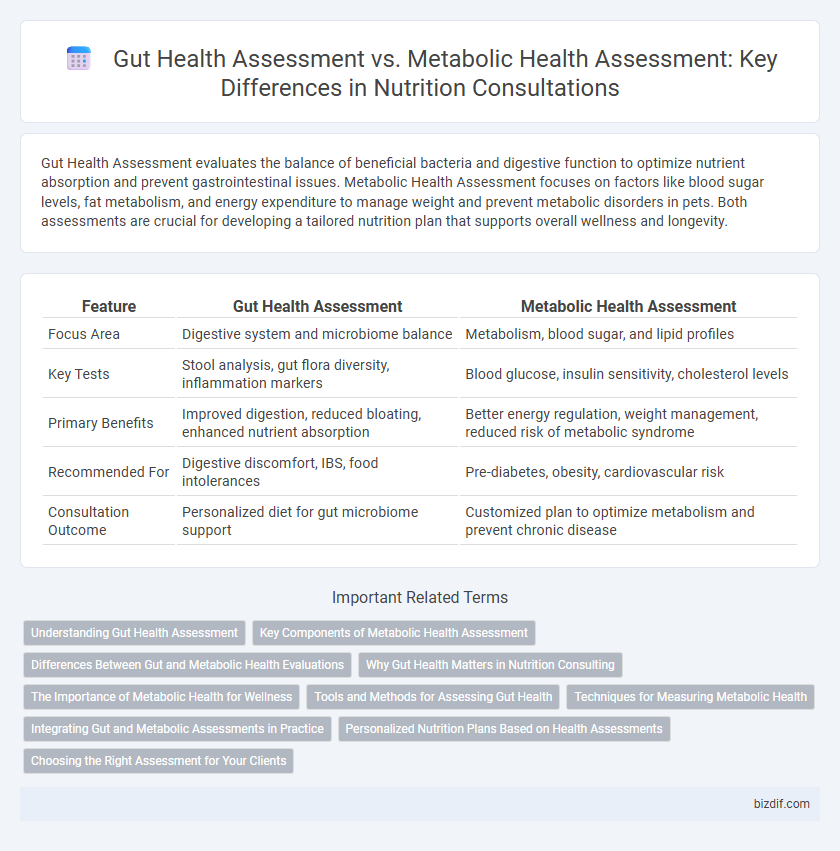Gut Health Assessment evaluates the balance of beneficial bacteria and digestive function to optimize nutrient absorption and prevent gastrointestinal issues. Metabolic Health Assessment focuses on factors like blood sugar levels, fat metabolism, and energy expenditure to manage weight and prevent metabolic disorders in pets. Both assessments are crucial for developing a tailored nutrition plan that supports overall wellness and longevity.
Table of Comparison
| Feature | Gut Health Assessment | Metabolic Health Assessment |
|---|---|---|
| Focus Area | Digestive system and microbiome balance | Metabolism, blood sugar, and lipid profiles |
| Key Tests | Stool analysis, gut flora diversity, inflammation markers | Blood glucose, insulin sensitivity, cholesterol levels |
| Primary Benefits | Improved digestion, reduced bloating, enhanced nutrient absorption | Better energy regulation, weight management, reduced risk of metabolic syndrome |
| Recommended For | Digestive discomfort, IBS, food intolerances | Pre-diabetes, obesity, cardiovascular risk |
| Consultation Outcome | Personalized diet for gut microbiome support | Customized plan to optimize metabolism and prevent chronic disease |
Understanding Gut Health Assessment
Gut Health Assessment evaluates the balance of microbiota, digestive efficiency, and intestinal inflammation to identify factors that affect nutrient absorption and immune function. It involves analyzing stool samples, gut barrier function, and inflammatory markers to detect dysbiosis, leaky gut syndrome, or bacterial overgrowth. Understanding gut health is essential for personalized nutrition plans aimed at improving digestion, reducing gastrointestinal symptoms, and enhancing overall metabolic processes.
Key Components of Metabolic Health Assessment
Metabolic Health Assessment primarily evaluates key indicators such as blood glucose levels, lipid profile, blood pressure, and waist circumference to determine the risk of metabolic syndrome and related disorders. It also includes insulin sensitivity tests, inflammatory markers, and liver function analysis to provide a comprehensive understanding of metabolic efficiency and disease risk. This assessment contrasts with Gut Health Assessment, which focuses on microbiome diversity, digestive enzyme performance, and gastrointestinal inflammation.
Differences Between Gut and Metabolic Health Evaluations
Gut Health Assessment primarily focuses on the analysis of the microbiome, digestive function, and nutrient absorption, identifying imbalances that affect gastrointestinal wellness. Metabolic Health Assessment evaluates parameters such as blood glucose levels, lipid profiles, insulin sensitivity, and energy metabolism to determine risk factors for metabolic syndrome and chronic diseases. These evaluations differ in biomarker specificity and clinical goals, with gut health targeting digestive integrity and microbial diversity, while metabolic health centers on systemic biochemical and endocrine functions.
Why Gut Health Matters in Nutrition Consulting
Gut health assessment provides critical insights into the microbiome's balance, which directly influences digestion, nutrient absorption, and immune function, making it essential for personalized nutrition consulting. Unlike metabolic health assessment that focuses primarily on biochemical markers like glucose and lipid levels, gut health evaluation uncovers underlying factors such as inflammation and dysbiosis that affect overall well-being. Prioritizing gut health enables practitioners to design targeted dietary interventions that optimize nutrient utilization and enhance long-term metabolic outcomes.
The Importance of Metabolic Health for Wellness
Metabolic health assessment evaluates key biomarkers such as blood glucose, lipid profiles, and insulin sensitivity to identify risks for chronic diseases like diabetes and cardiovascular conditions. This assessment is critical for personalized nutrition plans that enhance energy regulation, weight management, and overall wellness. Prioritizing metabolic health supports optimal organ function and reduces the risk of metabolic syndrome, fostering long-term health stability beyond gut microbiome analysis alone.
Tools and Methods for Assessing Gut Health
Gut health assessment utilizes tools such as stool analysis, breath tests, and microbiome sequencing to evaluate digestive function, detect imbalances, and identify pathogenic bacteria or yeast. Advanced methods include metabolomic profiling and gut permeability tests, providing insights into inflammation and barrier integrity. These assessments are essential for personalized dietary interventions targeting microbiota diversity and overall gastrointestinal wellness.
Techniques for Measuring Metabolic Health
Techniques for measuring metabolic health include indirect calorimetry to assess resting metabolic rate, glucose tolerance tests to evaluate insulin sensitivity, and lipid profiling to analyze cholesterol and triglyceride levels. Continuous glucose monitoring provides real-time blood sugar data, while body composition analysis via DEXA scans offers insights into fat distribution and muscle mass. These methods complement gut health assessments by detailing metabolic processes critical to personalized nutrition strategies.
Integrating Gut and Metabolic Assessments in Practice
Integrating gut health and metabolic health assessments offers a comprehensive understanding of a patient's overall wellness by examining the interplay between microbiome diversity and metabolic markers such as insulin sensitivity and lipid profiles. Utilizing advanced diagnostic tools like stool analysis alongside blood glucose and lipid panels enables targeted nutrition interventions that address both digestive balance and metabolic function. This holistic approach enhances personalized diet plans, optimizing outcomes in managing conditions like obesity, diabetes, and inflammatory bowel diseases.
Personalized Nutrition Plans Based on Health Assessments
Personalized nutrition plans leverage both Gut Health Assessments and Metabolic Health Assessments to tailor dietary recommendations that optimize individual well-being. Gut Health Assessments analyze microbiome composition and digestive function, informing interventions to enhance nutrient absorption and reduce inflammation. Metabolic Health Assessments evaluate biomarkers such as blood glucose, lipid profiles, and insulin sensitivity, guiding adjustments in macronutrient ratios and caloric intake for improved metabolic efficiency.
Choosing the Right Assessment for Your Clients
Gut Health Assessment examines the balance of intestinal microbiota, digestion efficiency, and inflammation markers to identify issues like IBS or leaky gut. Metabolic Health Assessment evaluates indicators such as blood glucose, insulin sensitivity, lipid profiles, and basal metabolic rate to determine risks for diabetes, cardiovascular disease, and metabolic syndrome. Selecting the right assessment depends on the client's symptoms and health goals, targeting digestive function for gut concerns or systemic metabolic regulation for chronic disease risk.
Gut Health Assessment vs Metabolic Health Assessment Infographic

 bizdif.com
bizdif.com